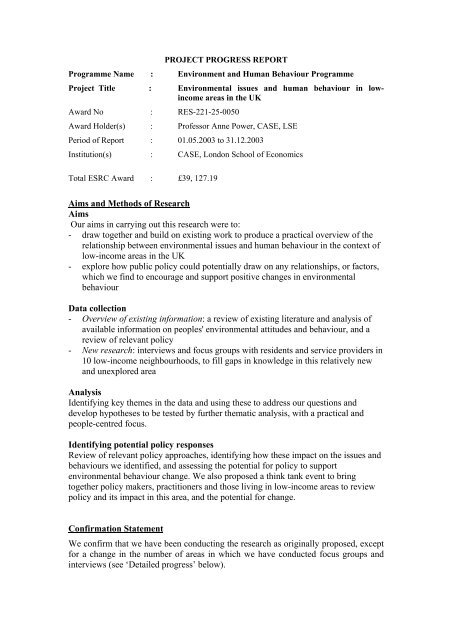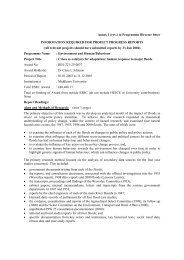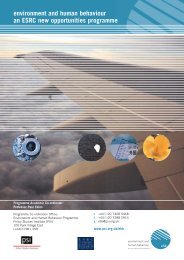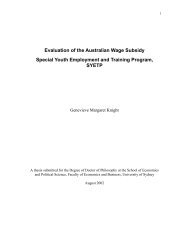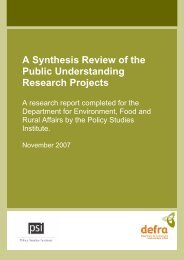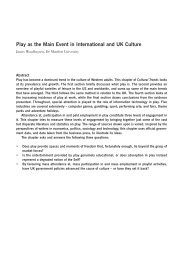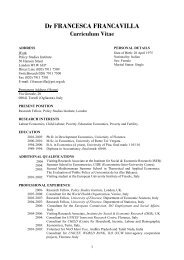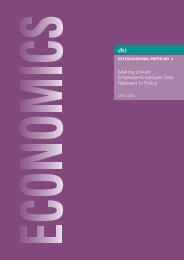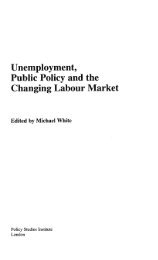Annual progress report - 2003 (pdf format) - Policy Studies Institute
Annual progress report - 2003 (pdf format) - Policy Studies Institute
Annual progress report - 2003 (pdf format) - Policy Studies Institute
Create successful ePaper yourself
Turn your PDF publications into a flip-book with our unique Google optimized e-Paper software.
PROJECT PROGRESS REPORT<br />
Programme Name : Environment and Human Behaviour Programme<br />
Project Title : Environmental issues and human behaviour in lowincome<br />
areas in the UK<br />
Award No : RES-221-25-0050<br />
Award Holder(s) : Professor Anne Power, CASE, LSE<br />
Period of Report : 01.05.<strong>2003</strong> to 31.12.<strong>2003</strong><br />
Institution(s) : CASE, London School of Economics<br />
Total ESRC Award : £39, 127.19<br />
Aims and Methods of Research<br />
Aims<br />
Our aims in carrying out this research were to:<br />
- draw together and build on existing work to produce a practical overview of the<br />
relationship between environmental issues and human behaviour in the context of<br />
low-income areas in the UK<br />
- explore how public policy could potentially draw on any relationships, or factors,<br />
which we find to encourage and support positive changes in environmental<br />
behaviour<br />
Data collection<br />
- Overview of existing in<strong>format</strong>ion: a review of existing literature and analysis of<br />
available in<strong>format</strong>ion on peoples' environmental attitudes and behaviour, and a<br />
review of relevant policy<br />
- New research: interviews and focus groups with residents and service providers in<br />
10 low-income neighbourhoods, to fill gaps in knowledge in this relatively new<br />
and unexplored area<br />
Analysis<br />
Identifying key themes in the data and using these to address our questions and<br />
develop hypotheses to be tested by further thematic analysis, with a practical and<br />
people-centred focus.<br />
Identifying potential policy responses<br />
Review of relevant policy approaches, identifying how these impact on the issues and<br />
behaviours we identified, and assessing the potential for policy to support<br />
environmental behaviour change. We also proposed a think tank event to bring<br />
together policy makers, practitioners and those living in low-income areas to review<br />
policy and its impact in this area, and the potential for change.<br />
Confirmation Statement<br />
We confirm that we have been conducting the research as originally proposed, except<br />
for a change in the number of areas in which we have conducted focus groups and<br />
interviews (see ‘Detailed <strong>progress</strong>’ below).
Highlights of the Research and Important Findings<br />
We are still in the process of analysing our data and results, but can <strong>report</strong> the<br />
following initial findings that are emerging from the work:<br />
Overview of existing evidence: We have found a good range of useful existing<br />
evidence and data, covering a wide range of relevant issues, including:<br />
- Local environmental conditions in low-income neighbourhoods<br />
- Impacts of local environmental issues on resource use and other global<br />
environmental issues, and visa versa<br />
- How local, and wider global, environmental issues impact on people and their<br />
quality of life, and environmental concerns of people living in low-income areas<br />
- Responses to environmental concerns and problems by people living in lowincome<br />
areas, and factors effecting people’s behaviour towards the environment in<br />
low-income areas<br />
New data: Through focus groups we have gathered evidence to fill gaps and clarify<br />
more detail in relation to the overview from existing findings, including:<br />
- further investigation of knowledge, concerns and awareness of global<br />
environmental issues among people living in low-income communities<br />
- evidence on the understanding of, and feelings about, links between local<br />
environmental issues and wider global environmental issues<br />
- in<strong>format</strong>ion on ideas about responsibility for local and global environmental<br />
issues, and mechanisms driving local and global environmental problems<br />
- evidence on people’s ideas about practical, and ‘ideal world’, solutions to<br />
local and global environmental problems<br />
- Some evidence about peoples’ willingness to change their behaviour, and<br />
factors preventing them doing so<br />
Some potentially interesting areas emerging from early analysis include:<br />
- Evidence that people living in low-income areas often have high awareness of,<br />
and concern about, global environmental issues. And that they are often actively<br />
thinking about their wider environmental behaviour and taking active steps to<br />
improve it, by for example, recycling, reducing car use, or carrying out practical<br />
conservation work. This contrasts interestingly with the stereotype of the<br />
environment as a middle class issue<br />
- A strong focus on individual responsibility for environmental problems, especially<br />
at the local level. People we talked to often tended to see ‘people’ or ‘individuals’<br />
as responsible for environmental problems as much as, or even rather than, local<br />
authorities, business or ‘the Government’<br />
- People readily identified ways in which global environmental problems impact on<br />
our everyday lives, such as through changes in weather, skin cancer, and wildlife<br />
changes. Again this contrasts interestingly with the idea that global environmental<br />
problems are often seen as remote and hard to relate to<br />
Overall, our study of the links between the local neighbourhood context, peoples’<br />
experiences and behaviour, and wider global environmental issues is proving<br />
interesting, productive and worthwhile. The picture emerging is reinforcing our<br />
hypothesis of the relevance of a local focus in relation to wider sustainable<br />
development challenges, and as a basis for policy initiatives to change behaviour.
Changes to original award<br />
None<br />
Research staff<br />
Name Status Period of appointment<br />
Professor Anne Award holder and research Providing input throughout project<br />
Power* supervisor<br />
Jake Elster Research officer Main researcher for the project. Part<br />
time for first 3 months, then full<br />
time.<br />
Catalina Turcu Research assistant Part time for 4 months<br />
Rebecca Gibbs Research assistant Part time for 3 months<br />
*Not funded under the programme award<br />
Publications<br />
None to date<br />
Engagement with potential research users (outside the academic community)<br />
Involvement of users in the research process:<br />
- We have directly elicited opinions and in<strong>format</strong>ion from local residents, community<br />
activists, and service providers in low-income areas. These groups, i.e. those<br />
directly involved with addressing environmental problems at the local level, will be<br />
one of the key audiences for our research findings<br />
- We will be directly engaging policy makers, practitioners and local activists through<br />
the ‘think tank’ event that we plan to run towards the end of the research. We hope<br />
to actively engage policy makers in organising and running the event in order to<br />
maximise their engagement with, and stake in, the lessons which emerge<br />
Dissemination of outcomes:<br />
- We have presented initial findings from our research through ESRC Environment<br />
and Human behaviour programme events and in collaboration with the ESRC’s<br />
dedicated media dissemination team<br />
- We have already started disseminating our initial findings, and engaging potential<br />
users with the ideas behind our research, through direct formal and informal contact<br />
with a wide range of organisation, including:<br />
- Jake Elster is on the Environment Agency’s environmental equality steering<br />
group, looking at links between environmental issues and equity<br />
- initial discussion about ideas and findings from our research, and agreement to<br />
share further findings, with the Wildlife Trusts’ head of programmes<br />
- helping the Sustainable Development Commission in their work on Sustainable<br />
Regeneration. Thinking from this research has informed that work<br />
- we are involved with Encams, the Sustainable Northern Ireland Programme,<br />
Forward Scotland, IDeA, and the Shell Better Britain Campaign, in developing<br />
new work, partly informed by this research. We will use these relationships to<br />
further disseminate the outcomes from this research.<br />
- we have ongoing relationships with the National Tenants Resource centre and the<br />
Community Development Foundation, both organisations with strong interest in<br />
the issues covered by this research
- we are developing a relationship with Groundwork UK, and will use this to further<br />
disseminate findings from this research<br />
Contribution to Programme<br />
The Environment and Human Behaviour Programme aims to look at 3 fundamental<br />
questions:<br />
- why do people behave as they do towards the natural environment?<br />
- how do/will people seek to adapt their behaviour in response to environmental<br />
change?<br />
- what public policy approaches might persuade people to change their behaviour,<br />
wither to mitigate negative environmental change, or to adapt to it, in a way that is<br />
least costly to society as a whole?<br />
It also aims to ‘identify new directions, theories and methods in environmental social<br />
science research’.<br />
Our research is contributing to these aims by, for example:<br />
- bringing together a wide range of existing evidence to help build and present a<br />
clearer picture of the importance of the local context and local action in relation to<br />
efforts to address wider global environmental and sustainable development<br />
challenges. The local environment, and links between environmental issues and<br />
low-income areas, are issues attracting increasing attention in policy and practice.<br />
This research will help consolidate existing knowledge and highlight gaps and<br />
promising areas for investigation<br />
- helping build a picture of factors which influence individuals’ behaviour towards<br />
the environment, and the complex ways in which everyday lives and behaviours<br />
are linked to wider environmental impacts<br />
- helping better understand the mechanisms by which people try and respond to<br />
environmental problems and pressures, and the ways they try and adapt their<br />
behaviour towards the environment<br />
- gathering evidence about what policy responses and mechanisms designed to<br />
influence behaviour may be more effective, or acceptable to people living in lowincome<br />
communities<br />
- through these insights providing potential lessons that could help policy makers<br />
and practitioners address environmental problems, mitigate environmental impacts<br />
on low-income communities, and support more positive environmental behaviour
Detailed <strong>progress</strong><br />
i) Development of research<br />
Months Headline developments<br />
Initial delays due to problems recruiting research assistant<br />
May-July Development of thinking, theories and hypotheses<br />
<strong>2003</strong> Gathering existing evidence and building picture of the field<br />
Identifying gaps for focus group research<br />
Gathering initial contacts for organising focus groups<br />
July – Aug Organising and running focus groups<br />
Sept / Oct Delays due to loss of research assistant and recruiting new assistant<br />
Oct - Dec Continuing with focus groups<br />
Service provider interviews<br />
Dec Focus groups and service provider interviews completed<br />
Preparation of data (e.g. transcription of focus groups)<br />
January 2004 Analysis started<br />
iii) Difficulties encountered<br />
The main difficulties encountered have been with staffing. We had initial delays<br />
recruiting a research assistant, and then this person left for another job, causing<br />
further delays while we replaced them.<br />
iv) Changes in objectives or methodology<br />
The only changes so far have been:<br />
- we have had to reduce the number of focus groups we ran from 10 to 6, due to<br />
delays discussed above. We are happy that we have gathered sufficient data from<br />
this smaller sample to address the questions we are interested in and give us valid<br />
results.<br />
Other than this we do not envisage any other changes to the research we originally<br />
planned.<br />
v) timetable changes<br />
Due to delays discussed above, we have had to apply for a two month extension to our<br />
project. We envisage that we will finish the work within this new timescale.


